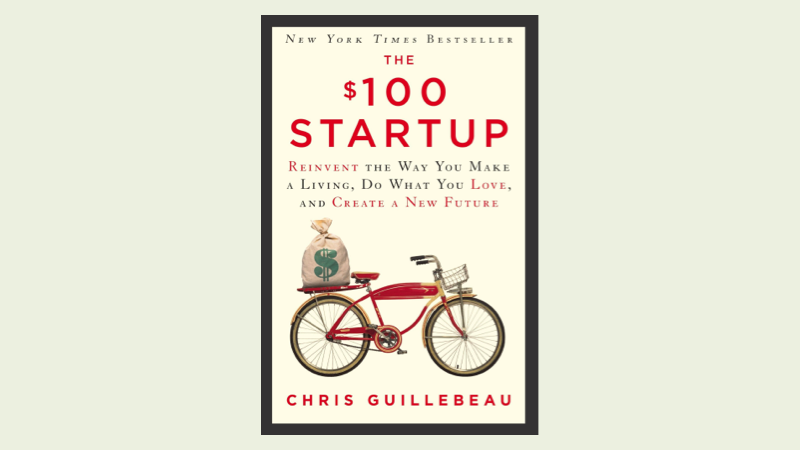The $100 Startup: Reinvent the Way You Make a Living, Do What You Love, and Create a New Future by Chris Guillebeau is an empowering guide for aspiring entrepreneurs looking to start a business on a small budget. The book highlights the principles of simplicity, freedom, and the pursuit of passion. Using real-life examples and practical advice, Guillebeau demonstrates that with creativity, grit, and a small initial investment, you can turn an idea into a successful venture.
Here’s a comprehensive summary of the book’s key takeaways.

1. The Power of Microbusinesses: Start Small, Think Big
Guillebeau’s research for The $100 Startup involved studying 1,500 small businesses worldwide that began with $100 or less and earned at least $50,000 annually. These “microbusinesses” have the power to make meaningful change without requiring large-scale funding, investors, or complicated strategies.
Key Takeaway: The goal isn’t necessarily to become a millionaire but to build a profitable, sustainable business that brings freedom, fulfillment, and financial independence.
2. Passion Meets Value: The Foundation of a Successful Microbusiness
According to Guillebeau, a profitable business lies at the intersection of what you love and what other people need. This balance ensures that your work is both fulfilling and marketable. However, passion alone isn’t enough. It has to translate into something that solves a problem or fulfills a need for your customers.
Key Takeaway: Find what excites you, then identify how this passion can add value to others. Ask yourself, “What are people willing to pay for?” and “How can I create something useful and desirable?”
3. Get Paid for Your Product, Not Your Time
Traditional businesses often rely on hourly wages or salaries, but Guillebeau encourages entrepreneurs to shift focus to creating products that generate income without continuous effort. Digital products, like e-books, online courses, or templates, are great examples of assets that can bring passive income.
Key Takeaway: Focus on products or services that can be scaled or sold repeatedly with minimal additional effort. This shift allows for better control of your time and income.
4. Lean Launch: Don’t Wait for Perfection
A central theme in The $100 Startup is that you don’t need a perfect product or grand plan to launch. Guillebeau advises entrepreneurs to start quickly with a “minimum viable product” (MVP), which is a basic version of the product to test the market. Collect customer feedback early and make improvements along the way.
Key Takeaway: Don’t wait until everything is perfect. Start small, launch early, and be prepared to pivot based on feedback. The quicker you get to market, the sooner you can start generating revenue and learning from real customers.
5. Focus on Customers, Not Business Plans
While traditional business wisdom often emphasizes detailed planning, The $100 Startup suggests focusing instead on understanding and connecting with your customers. Building an elaborate business plan is less valuable than a simple “one-page business model,” which should focus on answering critical questions like what you’re selling, who will buy it, and why they’ll buy it.
Key Takeaway: Understand your customers deeply. Ask for their feedback, know their problems, and tailor your offerings to solve those problems. Customer insights will often be more valuable than any extensive plan.
6. Don’t Be Afraid to Sell: Marketing as Storytelling
In The $100 Startup, Guillebeau emphasizes the importance of learning to sell. Selling doesn’t have to be pushy or unnatural; it’s about presenting the story of your product in a way that resonates with potential customers. Instead of hard-selling, focus on storytelling. Explain why your product is valuable, how it solves problems, and why it’s different from what’s already out there.
Key Takeaway: Master the art of storytelling in marketing. Share the journey, benefits, and unique features of your product. Remember, selling is an essential skill in building a successful business.
7. Start with What You Have
The title of the book itself reminds us that we don’t need vast resources or big investments to get started. Guillebeau argues that one of the biggest barriers for new entrepreneurs is waiting until they have “enough” money, skills, or connections. Instead, start with what you have now, even if it’s just a small skill or unique experience.
Key Takeaway: Use your existing skills, knowledge, or hobbies as a foundation. Begin small, using the resources and networks you already have to test your idea before making larger commitments.
8. Create Systems to Grow and Scale
As your microbusiness grows, implementing systems to streamline your workflow and increase efficiency is essential. Automation, outsourcing, or creating templates are some of the ways to scale without significantly increasing costs. The goal is to free up time to focus on new opportunities, creative projects, or refining the product.
Key Takeaway: Don’t just work harder—work smarter. Create systems that help you manage repetitive tasks, freeing up your time to expand your business and explore growth opportunities.
9. Embrace Failure as Part of the Process
Starting a business, especially with minimal investment, is risky. Not every idea will work, and some products or services might fail. Guillebeau emphasizes that failure is a natural part of the entrepreneurial journey and offers valuable lessons for improvement.
Key Takeaway: View failure as a step towards success. Don’t let setbacks discourage you; instead, use them as a learning experience to refine your approach.
10. Small Steps Lead to Big Changes
Guillebeau’s message is clear: you don’t need a massive business or millions of dollars to make a meaningful impact. Start small, focus on creating value, and build from there. Many of the businesses profiled in the book began with tiny steps and limited resources but grew over time by consistently meeting customer needs and scaling sustainably.
Key Takeaway: Great businesses don’t always start with big ideas. Sometimes, small steps toward your goal, combined with persistence and adaptability, are all you need to make a lasting impact.
Final Thoughts: Building a Life of Freedom and Fulfillment
The $100 Startup is more than just a guide to building a business; it’s a guide to creating a life of freedom and fulfillment. By starting small, focusing on what you’re passionate about, and creating something that adds value to others, you can design a business that provides not only income but also purpose. Guillebeau’s stories and advice inspire us to believe that financial and personal freedom is achievable, even with minimal resources.
So, if you’re considering a new venture but are held back by fear or limited funds, remember: start small, stay passionate, and focus on delivering real value to your customers.



